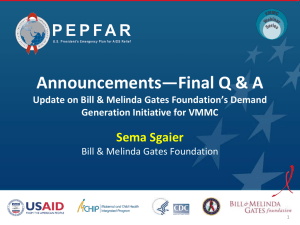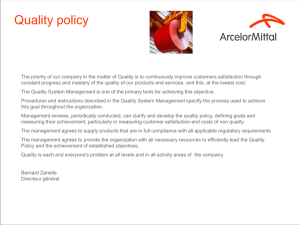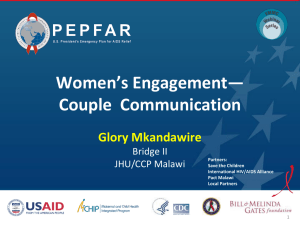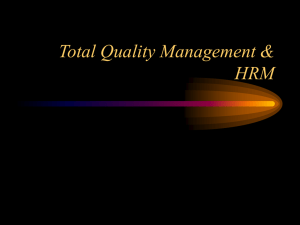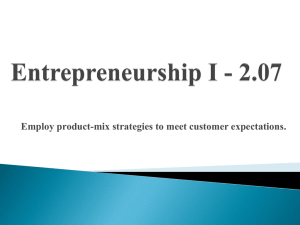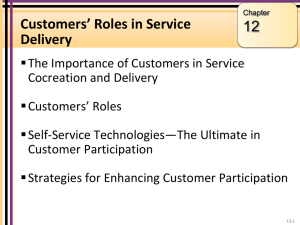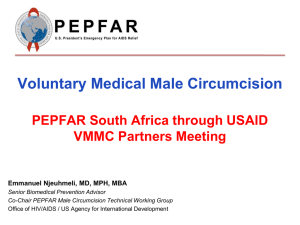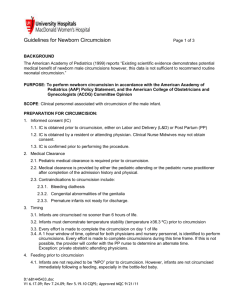WEAB008 - Amref Health Africa International Conference
advertisement
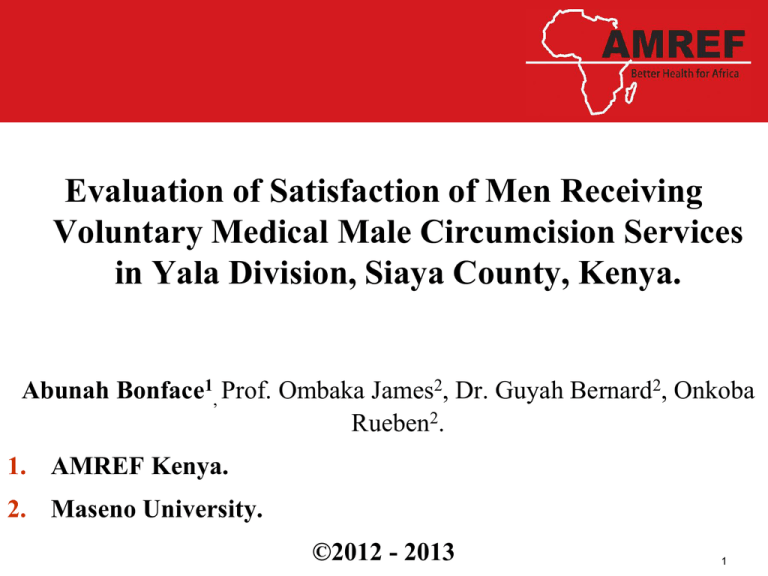
Evaluation of Satisfaction of Men Receiving Voluntary Medical Male Circumcision Services in Yala Division, Siaya County, Kenya. Abunah Bonface1, Prof. Ombaka James2, Dr. Guyah Bernard2, Onkoba Rueben2. 1. AMREF Kenya. 2. Maseno University. ©2012 - 2013 1 PRESENTATION OUTLINE Introduction/ Background. Research Questions. Methods. Findings and Discussion. Conclusions and Recommendations. 2 INTRO/BACKGROUND Circumcision is one of the oldest and most common surgical procedures worldwide, undertaken for religious, cultural, social, and medical reasons. Three RCTs were completed in Africa (Orange Farm, South Africa; Kisumu, Kenya; and Rakai, Uganda). All the three trials were stopped during an interim analysis due to the protective effect afforded by male circumcision against HIV acquisition, All the three RCTs reported remarkably consistent results of approximately 60% protective effect suggesting a similar efficacy in divergent populations (Auvert et al. 2005, Gray et al., 2007; Bailey et al., 2007). Based on the RCTs evidence WHO and UNAIDS issued recommendations on MC in march 2007, Kenyan MOH also adopted a policy on MC in 2007 that led to the roll out in 2008. Rolled out in former Nyanza province in 2008 (the province with the lowest MC and highest HIV prevalence) and targeted the sexually active males aged 15-49 years. 3 Kisumu MC Trial Clinic Orange Farm MC Center Rakai Research Center 4 MALE CIRCUMCISION DURING MOBILE VMMC 5 INTRO/BACKGROUND CONT’ Circumcision for men is an important component of a comprehensive multi-faceted National HIV prevention policy aiming at increasing demand and capacity of the health systems. Though VMMC services are free at all stages of client care, the set targets for some elements of its minimum package have never been met by the providers since the inception of the program 4 years ago. Thus it called for an evaluation study to assess the client’s level of satisfaction with the services offered and identification of areas that could be improved. Evaluation: A process of making a comparative assessment of the value of an intervention through systematic collection and analysis of data. 6 INTRO/BACKGROUND CONT’ Satisfaction: The customer level of approval when comparing a product’s perceived performance with his or her expectations. Patient satisfaction is a key criterion by which the quality of health care services is evaluated. Patient satisfaction data are routinely collected and used for continuous quality improvement by health care institutions and hospitals. This study measured the level of satisfaction among circumcised clients, established facilitatory and inhibitory factors behind the uptake of day 7 reviews and also sought opinions on how VMMC services could be improved. 7 RESEARCH QUESTIONS To what level are the clients satisfied with the received circumcision and counseling services? What are the facilitatory and inhibitory factors behind the uptake of day 7 post MC reviews in Yala division? How can VMMC service provision be improved in Yala division? 8 METHODS A cross-sectional survey was carried out on 277 men who received VMMC services at Yala SDH (56) and in Malanga, Marenyo, Nyawara and Ramula Health Centres (221). Data was collected through phone interviews using semistructured questionnaires with closed and open ended questions between 21st and 31st day following MC procedure. Analysis was done using descriptive statistics and inferential statistics using SPSS for the quantitative questions. Qualitative data was grouped into themes then sieved out. The themes were coded, grouped and analyzed. A chi-square tests were done to evaluate the statistical significance (p<0.05) of the respondent’s return to the health facility for review and other socio-demographic variables. 9 FINDINGS Returned For Review Total (N=277) Yes No P Value 18-25 125(45.1%) 55(44%) 70(56%) 0.19 26-35 95(34.3%) 47(49%) 48(51%) 36-45 25(9.1%) 13(52%) 12(48%) 46-55 22(7.9%) 16(73%) 6(27%) 56-65 8(2.9%) 5(63%) 3(37%) Over 65 2(0.7%) 1(50%) 1(50%) No formal educ. 32(11.5%) 16(50%) 16(50%) Primary 60(21.7%) 36(60%) 24(40%) Secondary 110(39.7%) 44(40%) 66(60%) college 51(18.4%) 30(59%) 21(41%) University 24(8.7%) 11(46%) 13(54%) Demographic characteristics and variables Age in Years Education Level 0.07 10 FINDINGS Employment Status Child Status Permanent Resident of Yala Health Facility Permanent 42(15.1%) 24 (57%) 18 (43%) Temporary 61(22.0%) 32 (52%) 29 (48%) Self employed 70(25.3%) 35 (50%) 35 (50%) Unemployed 104(37.6%) 46 (44%) 58 (56%) Has children 153(55.2%) 82(54%) 71(46%) No children 124(44.8%) 55(44%) 69(56%) Yes 151(54.5%) 90(60%) 61(40%) No 126(45.5%) 47(37%) 79(63%) Malanga(OPD) 24(8.7%) 14(58%) 10(42%) Marenyo(OPD) 87(31.4%) 41(47%) 46(53%) Nyawara(OPD) 91(32.8%) 46(51%) 45(49%) Ramula(OPD) 19(6.9%) 3(16%) 16(84%) Yala SDH(IPD) 56(20.2) 33(59%) 23(41%) 0.5 0.15 <0.0001 0.017 11 FINDINGS Level of satisfaction with the VMMC services offered were measured under 4 major categories of: counseling services, theatre services, discharge process, and outcome of the surgery. Satisfaction level with VMMC services offered 60 49 Proportion (%) 50 40 34 31 30 34 30 23 25 20 29 28 6 0 0 1 1 Very dissatisfied 5 Counseling Services Theatre Services Discharge Process 17 10 0 37 38 Outcome of Surgery 9 4 Somewhat dissatisfied Satisfied Somewhat satisfied Very satisfied 12 FINDINGS 23.8% strongly agreed, 53.4% agreed, 18.4% were neutral, 4.0% disagreed and 0.4% strongly disagreed. This shows that most of the beneficiaries believe that the services are well run by the service providers. Efficiency in running VMMC services 60% 50% 40% 30% 20% 10% 0% Strongly disagree Disagree Neutral Agree Strongly agree 13 FINDINGS Follow Up Care 9.5% were followed up (Overall). Sub group A (IPD) 58.9% while Sub group B (OPD) 47.1%. 35.7% consulted privately of which 63.6% paid for the services. Determinants of follow up care Statistical significant difference at alpha level of 0.05 No statistical significant difference at alpha level of 0.05 Health facility attended (p=0.0173) Age group (p=0.191) Residence of Yala (p<0.001) Education attained (p=0.0731) Satisfaction with discharge process (p=0.0150) Employment status (p=0.5023) Marital status (p=0.2633) Religion (p=0.1285) Satisfaction with counseling services (p=0.2154) Satisfaction with theatre services (p=0.1546) Satisfaction with surgical outcome (p=0.2732) Efficiency in running of services (p=0.0986) 14 FINDINGS Reason for Coming for review Free and efficient services Education/instruction during counseling Fear of ill health Medication/Bandage removal Emergency reviews/Adverse events Total Frequency Percent (%) 17 12.4 43 17 31.4 12.4 27 19.7 33 137 24.1 100.0 “Male circumcision is provided free of charge, at no cost and the surgical procedure is very fast and efficient”. 15 FINDINGS Reasons for Non-return for review Occupational engagements/Presumption of healing Lack of free transport/Financial Problems/Poor Weather Lack of Post-Op care information and fear of pain Inconsistency of teams/Nature of service providers Frequency Proportion (%) 76 54.3 28 20.0 21 15.0 6 4.3 Private consultations 5 3.6 Distorted body image 2 1.4 Non-Response 2 1.4 140 100.0 Total “I came back after one week as instructed but did not find the Doctor”. 16 FINDINGS Strongest points in service delivery Non-response Free, available and efficient services Staff competency Educative and Informative counseling Intense Mobilization 24 hours emergency response All gender team representations Total Frequency 28 Proportion (%) 10 76 80 27 29 46 27 17 10 9 3 11 277 4 100 17 FINDINGS Weakest points in service delivery Frequency Proportion (%) Non-response 32 12 Mandatory HIV testing Inconsistency of teams and transport 23 8 58 21 Lack of compensation 26 9 Long waiting time All gender teams representations 49 18 30 11 Ineffective pain management Lack of Operations during week-ends and in all facilities 28 10 28 10 Inadequate refreshment 3 1 277 100 Total 18 FINDINGS Opinions on service delivery and its improvement MOH staff empowerment. Nationwide roll out of VMMC/Moonlight/Home based service provision. Client compensation. Intense mobilization. Effective pain management 19 CONCLUSIONS AND RECOMMENDATIONS Findings showed that men are generally satisfied with VMMC services offered and the beneficiaries agree that the services are well run, however, there are elements that need to be improved in order for more people to be reached and for the services to be friendly and customer oriented. There is need to improve service delivery and review of the policy, strategies and operations to meet the efficiency and effectiveness threshold in a bid to combat new HIV infections. Further studies should be considered on the effects of HIV testing on acceptability of VMMC. 20 “ 21
